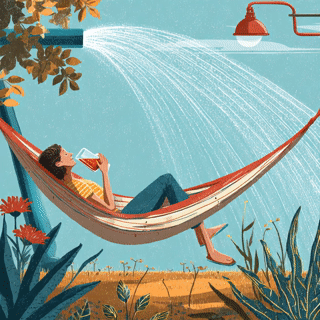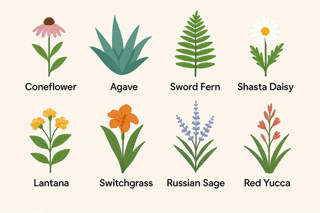EPIC Garden Center Spotlight: Valley View Farms
- EPIC

- Jul 8
- 7 min read
Updated: 7 days ago
For over 60 years, family-run Valley View Farms in Cockeysville, Maryland has delighted gardeners with a 10-acre wonderland of plants—one of the largest selections in the region. Beloved for its knowledgeable staff, warm atmosphere, and festive traditions (like a nationally-known Christmas Shop), Valley View Farms offers a unique gardening experience making them our inaugural Garden Center of the Month. We spoke with Retail Greenhouse Manager Carrie Engel to learn more about what makes this place so special.

For those just starting out in gardening, what are your top tips for a beginner’s success? Know your garden area including sun/shade availability, have a water source nearby, work on the soil to achieve good drainage with some water holding capacity, start with healthy plants, get to know your local, independent garden center and your state's university extension program.
What are your top tips for selecting deer-resistant plants? Look for plants with textured leaves, thorns, fragrance. Most garden centers will sign their deer-resistant plants or display them together. Use a deer repellent every 30 days or according to label requirements. Keep an eye on the plants; your deer may not have gotten the memo on which plants are resistant and will try them anyway.
In your experience, what is one under-appreciated plant or gardening practice that you wish more gardeners would embrace and why? Start with good soil, be it the addition of compost in gardening beds or using good potting mixes in all containers.
Pollinators are crucial for any garden. What tips do you have for gardeners everywhere to create habitats for bees, butterflies, and other pollinators? We all want to encourage pollinators. Native plants are a good start to provide nesting areas, shelter and food for pollinators. Other nectar-producing plants, including many annual flowers like lantana and salvia, are great to use for nectar when natives may not be blooming. Keep areas wild, leave stacks of firewood that native bees may use, avoid the perfectly tended garden, leave the leaves, and provide water for our critters. Nature does a great job at balancing the beneficial insects in the landscape.
Houseplants are surging in popularity. Are there any lesser-known houseplant varieties you’d suggest to enthusiasts looking for something different? Houseplants are very popular, especially for our younger customers. There are so many; the turtleback plant, any of the new (or what was old that's new again) philodendron, scores of begonias and succulents still rank in popularity. I suggest going to the garden center at least monthly to see what's new and stay on top of the selection by following us on Instagram and Facebook.
You offer 77+ types of tomatoes—how can folks choose the right variety? My favorite job is helping customers decide what varieties will work best. Growing in a pot? Go with a determinate (bush) variety. Making sauce or juice? Try a plum variety. Want to get the kids involved? Grow small-fruited cherry tomatoes in orange, red, purple or black. Need a combination? Want to grow heirloom varieties? Do you prefer hybrid types that are more disease resistant? There is something for everyone.
Your Water Garden department is well-known nationally. It’s named one of the top three in the country! What advice would you give to someone interested in starting a water garden or pond in their backyard? Start with full sun. Go with a larger pond than you thought you wanted. So many times, water garden enthusiasts want to go larger after their initial installation. Talk to our people about what features they may want, maybe a fountain in the center or a waterfall feature. Have our experts recommend the right filtration system, pump size and liner material. Then, have fun choosing plants and fish. Selling ponds and accessories does bring in a lot of repeat business. Like your home, constant improvements and additions are to be expected.
We understand that you grow many of your plants at your own farm in Maryland. How does having your own growing operation influence the quality and variety of plants you offer at the garden center? The quality and variety of available plants is exactly why we do grow so much of our own material, including all of our hanging baskets, vegetable plants, most of our annuals and seasonal plants like mums and poinsettias. We are able to grow our plants with space to give them more room to grow on a schedule of our choosing We can choose exactly what varieties we grow, looking to trial gardens, trade shows and listening to our customers.
Valley View Farms offers an enormous variety of plants—in fact, you boast the largest selection of annuals, perennials, and vegetable plants in Maryland. How do you decide which plants to stock each season, and what makes your plant selection special or unique? We are able to break down our buying and growing, often with a specialist in each area. For example, we have Jen buying our herbs. By having her focus there, we have made that $300,000 department within our plant department. Our tropical and houseplant buyer is able to do the same. Perennials and nursery (our woody trees and shrubs) each have a manager/buyer who can concentrate on their areas as well, offering plants ordered on a weekly (or more) basis. We keep up with the selections through trade shows like MANTS and Cultivate as well as checking in constantly with our growers to see what they have available.
Running a large garden center comes with unique challenges (from weather impacts to plant health). What are some of the biggest challenges you face behind the scenes, and how do you overcome them to keep things running smoothly for your customers? You are so right about the weather. Most of our sales area is covered, except for our pond and nursery departments. We offer umbrellas for shopping, always have customer helpers available to get customers from their car to the store and back. One of our unique features is that are parking lot is on a hill. Our customer helpers aid customers with loading their cars in this environment. We are so busy in the spring that our 300-car parking lot is needed for customers. We were able to find off-site parking on the weekends around an area office building. We are on a very busy 4-lane road. Luckily our plant material and the buildings we have muffle some of the sound. Our plants are all inspected upon arrival, and we rarely need to take care of insect issues, but we do have 3 trained people to keep those types of issues under control. Other day-to-day issues may involve our POS system for which, again, we have trained people on site and excellent service from our providers.
From supporting local charities to hosting educational workshops, its clear community engagement is important to Valley View Farms. Why is community involvement a big part of your mission? Our community extends through the Baltimore Metro area. There are so many people working to make this world a better place, and we want to be a part of it. Our partnership with WBAL Radio and TV has offered us a chance to help children in need in our community. Garden Clubs work to make their communities more beautiful, so we are honored to host workshops for them and the general public. Its nice to be part of something that betters our lives in measurable ways.
Your team includes many long-time employees—some have been with Valley View Farms for decades! How do you foster such loyalty and maintain a knowledgeable, passionate staff? The truth is I don't know. We all have a shared experience with the Punkey and Billy, our original owner. (Andy is Billy's son) Both men really hammered the idea of sharing the correct knowledge with our staff and customers and offering the best plants and other merchandise that we are able to provide. Our connection with our vendors is and always has been, of ultra importance. Keeping up with them and working to get the products that our customers want is so important. Many of our vendor relationships, Brian Bate included, go back decades to previous managers who taught us the importance of working together. We are like family, who support and help each other out in a company with strong ethics and values.
Your Christmas Shop is nationally known as a holiday wonderland that draws visitors from all over. What does it take behind the scenes to transform the garden center for the holiday season, and why do you think this tradition resonates so strongly with people? A seasonal business does its best to bring in business all year. I think that a lot of us love that we move whole buildings of inventory around to make room for Christmas. Our buyers work January through March going over last year's sales and order for fall of that year. In June, inventory starts to arrive at our warehouse, getting priced, sorted by themes and stored until called for. In August, our plant/greenhouse starts to consolidate to allow our garden hardgoods and pottery department to move out into the area. Lighted branches are placed on the ceiling, gondolas and shelving put in place and trees from 3'-12' decorated in the 12,000 square foot space. By October, most of the shop is up. In late November, live and fresh-cut trees, wreaths and poinsettias arrive. So many families enjoy the tradition of visiting and choosing special ornaments for themselves, family and friends. Tradition is still very strong with family, and it unites them when they visit. Watching the grandkids' faces light up as generations of families enter the store is amazing.
With over more than six decades in business, you’ve seen gardening trends and customer needs evolve. What do you foresee for the future of the garden center? The garden center will continue to evolve as a community meeting place and source for information, plants and other gardening merchandise. We will continue to look for more native plants, fewer invasive ones, and more plants that help us in our spaces. Houseplants have brought us younger people, who, as they become homeowners, will want sustainable ways to include plants in their lives. Plants help us breathe, eat, survive, live with other species, allow us to reflect and rest. There will always be that need; plants and gardening help us connect to the natural world around us.




Comments